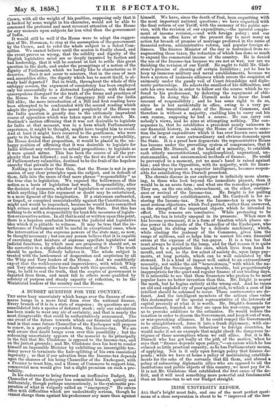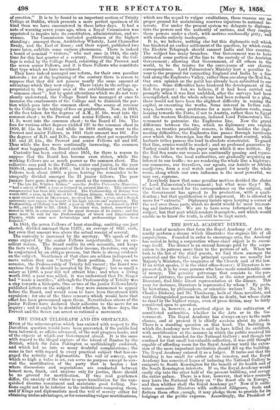IRISH UNIVERSITY REFORM.
Aan that's bright must fade, and one of the most perfect speci- mens of a close corporation is about to be "improved off the faoe
of creation." It is to be found in an important section of Trinity College at Dublin, which presents a more perfect specimen of its kind than we have encountered in these latter days. It had a note of warning seven years ago, when a Royal Commission was appointed to inquire into its constitution, administration, and re- venues. The Commission included gentlemen of the highest standing ; amongst them, Archbishop Whately, Lord Chancellor Brady, and the Earl of Rosse ; and their report, published two years later, exhibits some curious phenomena. There is indeed a board of nominal "visitors," who met once in 1845, the only time for this last quarter of a century. Everything in the Col- lege is ruled by the College Board, consisting of the Provost and the seven senior Fellows, and it is these Fellows who constitute that type which we have mentioned.
They have indeed managed one reform, for their own peculiar interests ; for at the beginning of the century there is reason to suppose that they did not possess nearly the same amount of advantage which they now enjoy. There exists in the college ap- propriated to the general uses of the establishment at large, a "common chest" ; but by quiet alterations which we do not very clearly understand, the College Board has managed at once to increase the emoluments of the College and to diminish the por- tion which goes into the common chest. One source of revenue to the College is the taking of fees on graduation. Now, in 1810, of the fees taken for the degrees of A.M., 2/. 10s. went into the common chest ; to the Provost and senior Fellows, nil; in 1851 1/. 2s. went into the common chest ; to the Board 4/. 10s. The fees for various other degrees yielded 12/. to the common chest in 1810, 2/. 158. in 1851; and while in 1810 nothing went to the Provost and senior Fellows, in 1851 their amount was 16/. For the degrees of B.D. and D.D., the common chest got respectively 151. and 2/. 158., the Provost and senior Fellows nil and 19/. Thus while the fees were continually increasing, the common chest was beggared, the Board enriched.
Curiosity has been excited since 1851, for there is reason to suppose that the Board has become even richer, while the working Fellows are as much poorer as the common chest. The collective sum paid to the Fellows, senior and junior, in the year 1850-51, amounted to 30,4001.; but it is supposed that the senior Fellows took about 2000/. a piece, leaving the remainder to be unequally divided amongst the 21 junior fellows. The poor juniors have gone down quite as much as the common chest.
" The late Dr. Whittey Stokes," says the Dublin University Magazine, "had a salary of 9001. a year as lecturer in natural history. This excessive remuneration has been duly diminished. The Professorship of Botany was worth 600/. a year, in the time of Dr. William Allman, while his successor, a most eminent man in his science, received but 200/. a year, and a Scotch university now enjoys the benefit of his high talents and reputation. The Professorship of Oratory was 1001. a year in 1762, but was reduced in 1847 to 601., and in 1850 to 35/. (Irish.) Its salary was, indeed, somewhat re- stored in 1855, in consequence of the great increase of its duties ; and the same must be said for the Professorships of Greek and Experimental Physics, while some new lectureships and professorships have been founded."
In 1851, the seven Fellows of least standing, omitting one just elected, divided amongst them 1137/., an average of 162/. each, but even that amount was above the actual receipt of several. The curiosity is increased by the mystery. We speak of the rums enjoyed by the senior Fellows conjecturally, for an ex- cellent reason. The Board audits its own accounts, and keeps the facts veiled. The amount of their income, therefore, can only be conjectured by an oblique process, but there is strong evidence on the subject. Gentlemen of that class are seldom indisposed to move unless they can " better " their position. Now, on one occasion, the Professorship of Trinity fell vacant ; the Board was anxious that it should be accepted by Dr. Singer ; but so small a salary as 1200/. a year did not attract him ; and when a living worth 500/. a year was added, it was understood that Dr. Singer had "made a sacrifice," although the Professorship of Trinity was a step towards a bishopric. One or two of the junior Fellows lately published letters on the subject : they were summoned to appear before the Board, and would seem to have been threatened with expulsion; for one of the three censures which would have that effect has been pronounced upon them. Nevertheless others of the junior Fellows have declared their adhesion to the move for an inquiry ; and it ought to be doubtful whether, in these days, the Provost and the Seven can arrest so rational a movement.



























 Previous page
Previous page